List of fastest production motorcycles
The fastest production motorcycle for a given year is the unmodified motorcycle with the highest tested top speed that was manufactured in series and available for purchase by the general public. Modified or specially produced motorcycles are a different class, motorcycle land-speed record. Unlike those records, which are officially sanctioned by the Fédération Internationale de Motocyclisme (FIM), production model tests were conducted under a variety of unequal or undefined conditions, and tested by numerous different sources, mainly motorcycling magazines. This has led to inconsistent and sometimes contradictory speed statistics from various sources.
Fastest production motorcycles
Several models went out of production before being surpassed by a contemporary with a higher top speed. Until a model was introduced that was faster than any previous motorcycle, the fastest bike on the market for a given year was actually slower than an earlier, out of production bike. Models which are actual top speed record holders have their make, model, and speed in bold font, while slower models which were only the fastest in their own time are in italic. For example, in 1956, the Vincent Black Shadow remained the fastest motorcycle to date, with a 125 mph (201 km/h) top speed, but it was no longer in production. The fastest model on the market in 1956 was the BSA Gold Star Clubman, which at 110 mph (180 km/h) was not a record holder, but is listed for the sake of illustrating a more complete timeline.
| Make & model | Model years | Engine | Displacement | Power | Top speed | Image | Notes |
|---|---|---|---|---|---|---|---|
| Lightning LS-218 | 2014- | Electric motor | N/A | 200 bhp (150 kW) | 218 mph (350.84 km/h) | Using an LS-218 modified from street-legal form, using "high speed gearing and fairing". First electric vehicle to hold the title of the world's fastest street-legal production motorcycle,[1][2][3][4][5] to have won against ICE motorcycles in a professional road race, and to have won any such race using solar power.[6] | |
| Ducati Panigale R | 2013- | V-twin | 1,198 cc (73.1 cu in) | 202 bhp (151 kW) | 202 mph (325 km/h) | .jpg.webp) |
Top speed achieved with OEM track-only exhaust system.[7][8][9] |
| BMW S1000RR | 2009- | Inline four | 999 cc (61.0 cu in) | 199 bhp (148 kW) | 188 mph (303 km/h) | 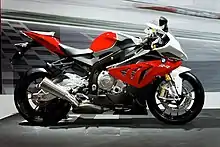 |
BMW considered to have initiated the "gentlemen's agreement"; first party to agreement to exceed self-imposed limit.[10] |
| MV Agusta F4 R 312 | 2007-08 | Inline four | 998 cc (60.9 cu in) | 183 bhp (136 kW) | 185.4–193.24 mph (298.37–310.99 km/h) |  |
First European motorcycle exceeding "gentlemen's agreement"; MV Agusta not known to have been a party.[11][12][13][14][15] |
| Kawasaki ZX-14 | 2006– | Inline four | 1,352 cc (82.5 cu in) | 163.3 hp (121.8 kW)† | 186 mph (300 km/h) |  |
Speed limited[16] |
| Kawasaki ZX-12R | 2000–05 | Inline four | 1,199 cc (73.2 cu in) | 178 bhp (133 kW) | 186 mph (300 km/h) |  |
Speed limited[17][18][16] |
| Suzuki Hayabusa (first generation) | 2000–2007 | Inline four | 1,299 cc (79.3 cu in) | 173 bhp (129 kW) | 186 mph (300 km/h) |  |
Speed limited[18][16][19][20] |
| Suzuki Hayabusa (first generation) | 1999– | Inline four | 1,299 cc (79.3 cu in) | 173 bhp (129 kW) | 188–194 mph (303–312 km/h) |  |
Last model before gentlemen's agreement.[18][16][19][20] |
| Honda CBR1100XX Super Blackbird | 1996–2007 | Inline four | 1,137 cc (69.4 cu in) | 162 bhp (121 kW) | 170–180 mph (270–290 km/h) |  |
[18][16] |
| Bimota YB8 Furano | 1992-1993 | Inline four | 1,002 cc (61.1 cu in) | 164 hp (122 kW) | 172 mph (277 km/h) | By some measures, faster than Kawasaki Ninja ZX-11.[21] | |
| Kawasaki Ninja ZX-11 | 1990–2001 | Inline four | 1,052 cc (64.2 cu in) | 145 bhp (108 kW) | 169–176 mph (272–283 km/h) |  |
[18][16][17][22] |
| Bimota YB6 EXUP | 1989–1990 | Inline four | 1,002 cc (61.1 cu in) | 147 bhp (110 kW) | 170 mph (270 km/h) |  |
[18] |
| Yamaha FZR1000 "EXUP" | 1989-1995 | Inline four | 1,003 cc (61.2 cu in) | 145 hp (108 kW) | 167 mph (269 km/h) | .jpg.webp) |
[23] |
| Kawasaki Tomcat ZX-10 | 1988–1990 | Inline four | 997 cc (60.8 cu in) | 135 hp (101 kW) | 165 mph (266 km/h) |  |
[17][24] |
| Yamaha FZR1000 "Genesis" | 1987-1988 | Inline four | 989 cc (60.4 cu in) | 135 hp (101 kW) | 158.4–160 mph (254.9–257.5 km/h) |  |
By some measures, faster than Honda CBR1000F.[25][26] |
| Honda CBR1000F | 1987-1999 | Inline four | 998 cc (60.9 cu in) | 132 hp (98 kW) | 154–164 mph (248–264 km/h) |  |
[25][27][28] |
| Suzuki GSX-R 1100 (G-H-J) | 1986-1988 | Inline four | 1,052 cc (64.2 cu in) | 125 hp (93 kW) | 160 mph (257 km/h) |  |
[25] |
| Kawasaki GPZ900R Ninja | 1984–1996 | Inline four | 908 cc (55.4 cu in) | 113–115 bhp (84–86 kW) | 151–158 mph (243–254 km/h) | 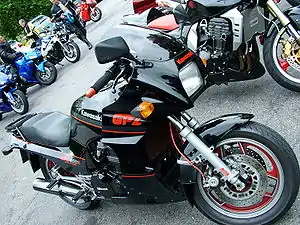 |
[18][29][30] |
| Honda VF1000R | 1984–1988 | V-four | 998 cc (60.9 cu in) | 122 bhp (91 kW) | 150 mph (240 km/h) |  |
[18] First to exceed Vincent Black Lightning after 35 years |
| Laverda Jota | 1976–1981 | Inline three | 981 cc (59.9 cu in) | 90 bhp (67 kW) | 140–146 mph (225–235 km/h) |  |
[18][31][32] |
| Ducati 900SS | 1975–1982 | V-twin | 864 cc (52.7 cu in) | 79 bhp (59 kW) | 135 mph (217 km/h) | 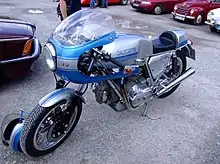 |
[18][33] |
| Kawasaki Z1 | 1972–1975 | Inline four | 903 cc (55.1 cu in) | 82 bhp (61 kW) | 132 mph (212 km/h) |  |
[18][34] |
| BSA Rocket 3/Triumph Trident | 1968–1975 | Inline three | 740 cc (45 cu in) | 58 bhp (43 kW) | 125 mph (201 km/h)* |  |
[18] |
| Harley-Davidson XLCH Sportster | 1958–1971 | V-twin | 883 cc (53.9 cu in) | 55 bhp (41 kW) | 122 mph (196 km/h) |  |
[35] |
| BSA Gold Star Clubman | 1956–1963 | Single | 499 cc (30.5 cu in) | 42 bhp (31 kW) | 110 mph (180 km/h) | 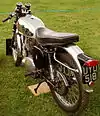 |
[18] |
| Vincent Black Lightning | 1949–1952 | V-twin | 998 cc (60.9 cu in) | 70 bhp (52 kW) | 150 mph (240 km/h) | 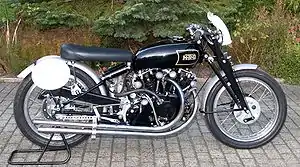 |
[18][29][36][37] First to exceed Brough Superior SS100 Pendine after 22 years. Record held for 35 years. |
| Vincent Series A Rapide | 1936–1940 | V-twin | 998 cc (60.9 cu in) | 45 bhp (34 kW) | 110 mph (180 km/h) | [18] | |
| Crocker V-twin | 1936–ca. 1941 | V-twin | 998 cc (60.9 cu in) | 50 bhp (37 kW) | 110 mph (180 km/h) |  |
[18] |
| Brough Superior SS100 Alpine Grand Sports | 1934–1940 | V-twin | 996 cc (60.8 cu in) | 75 bhp (56 kW) | 110 mph (180 km/h) |  |
[38] |
| Brough Superior SS100 Pendine | 1927–1940 | V-twin | 981 cc (59.9 cu in) | 45 bhp (34 kW) | 110 mph (180 km/h) | [38] Record held for 22 years | |
| Brough Superior SS100 | 1925–1940 | V-twin | 988 cc (60.3 cu in) | 45 bhp (34 kW) | 100 mph (160 km/h) |  |
[18][29] |
| Excelsior V-twin | 1918–1931 | V-twin | 992 cc (60.5 cu in) | 20 bhp (15 kW) | 80 mph (130 km/h) | [18] | |
| Cyclone V-twin | 1916–1917 | V-twin | 996 cc (60.8 cu in) | 25 bhp (19 kW) | 85 mph (137 km/h) | _-_The_Art_of_the_Motorcycle_-_Memphis.jpg.webp) |
[18] |
| Pope Model L | 1914–1920 | V-twin | 999 cc (61.0 cu in) | 12 bhp (8.9 kW) | 70 mph (110 km/h) |  |
[18][31] |
| Williamson Flat Twin | 1913–1920 | Flat twin | 964 cc (58.8 cu in) | 55 mph (89 km/h) | 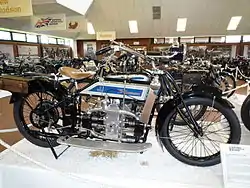 |
[18] | |
| Scott two speed | 1912– | Parallel twin | 532 cc (32.5 cu in) | 3 bhp (2.2 kW) | 50 mph (80 km/h) |  |
[18] |
| FN Four | 1911–1931 | Inline four | 491 cc (30.0 cu in) | 4 bhp (3.0 kW) | 40 mph (64 km/h) |  |
[18][29] |
| Werner New Werner | 1901–1908 | Single | 230–333 cc (14.0–20.3 cu in) | 2–3.25 bhp (1.49–2.42 kW) | 30 mph (48 km/h) | 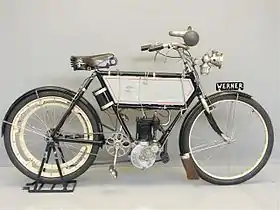 |
[29][39][40][41] |
| Werner Motocyclette | 1898–1900 | Single | 216 cc (13.2 cu in) | 15.5–22 mph (25–35 km/h) | [39][40][41][42] | ||
| Hildebrand & Wolfmüller | 1894–1897 | Parallel twin | 1,500 cc (92 cu in) | 2.5 hp (1.9 kW) | 25–28 mph (40–45 km/h) |  |
First production motorcycle.[18][29] |
- *^ Other models that tied the Trident at 125 mph (201 km/h) are the 1972 Laverda SFC and Moto Guzzi V7 Sport.[18]
- †^ Rear wheel horsepower. See Motorcycle testing and measurement.
Motorcycles excluded from the list
Some motorcycles were not considered to be the fastest production vehicles, for various reasons. Here is a list of some well known motorcycles that have not been able to meet standards needed to be the fastest production motorcycles.
| Make & model | Model years | Engine | Displacement | Power | Top speed | Image | Notes |
|---|---|---|---|---|---|---|---|
| Kawasaki Ninja H2R | 2015- | Inline 4 | 998 cc (60.9017 cu in) | 310/326 horsepower (230/243 kW; w/out ram air) | 250 mph (400 km/h) |  |
Excluded as the record-beating H2R variant is in limited production only, and thus does not qualify as a production vehicle.[43] |
Gentlemen's agreement to end competition
After just over a century of one-upmanship by motorcycle manufacturers, beginning with the 1894–1897 Hildebrand & Wolfmüller, the competition to create the fastest production motorcycle reached a truce, with the arrival of the 1999 Suzuki Hayabusa, that lasted about 8 years.[44][17][45][46] A gentlemen's agreement was made among the major motorcycle manufacturers to limit the speed of their machines to 300 km/h (186 mph), starting with 2000 models.[44][17][47]
After the 1999 Hayabusa sent shockwaves by exceeding the Honda CBR1100XX's record by more than 10 mph (16 km/h), and rumors and leaks from Kawasaki hinted that their upcoming 2000 Ninja ZX-12R would pass the 200 mph (322 km/h) milestone, some regulators and politicians in Europe called for an import ban against high speed motorcycles.[44] There were fears that there would be "an outbreak of illegal racing as riders try to break the 200 mph barrier".[48][49] To preempt regulation and avoid negative publicity, the manufacturers voluntarily ended the race to ever higher speeds.[44][47]
Sources vary as to whether this unofficial agreement is precise or only approximate, and whether it is defined as 300 km/h or as 186 mph, though the European and Japanese manufacturers normally use metric units. While Honda did announce that its motorcycles would not go faster than 300 km/h, Suzuki and Kawasaki would not speak on record about this issue.[50] The agreement between them and the other brands has never been officially acknowledged by the manufacturers, though media sources report it via unnamed informants, and by testing the top speed of motorcycles known to be capable of exceeding the arbitrary maximum.[50][51] So for 2000[17] models and later motorcycles, the question of which brand's bike was fastest could only be answered by tampering with the speed limiting system, meaning that it was no longer a contest between stock, production motorcycles, absolving the manufacturer of blame and letting those not quite as fast avoid losing face.[51] But the speed war continued underground, out of the spotlight, with fierce competition among enthusiasts of the "200 mph club", albeit with the slight technical modification necessary to bypass the speed limiter, separating that war from the ostensibly at-peace world of stock motorcycles.[47][52]
Breakaways from the agreement
MV Agusta advertised their 2007 F4 R 312 as capable of 312 km/h (194 mph), hence the "312" in the name, "because MV sees no reason to abide by the manufacturers' agreement ... Politics be damned: MV is Italian and the Italians have a national imperative to make their bikes as fast as possible," in the opinion of motoring journalist Roland Brown.[11][12] Italian magazine Motociclismo claimed to have achieved 193.24 mph (310.99 km/h) testing the F4 R 312, more or less confirming the claimed speed and tying, if not exceeding, the 1999 Suzuki Hayabusa's tested speeds of 188–194 mph (303–312 km/h),[13] whereas Sport Rider were only able to achieve a 185.4 mph (298.4 km/h) top speed, stating that "it would take a major horsepower boost in order to make up the 8 mph deficit".[53]
Cycle World reported that "the same BMW who instigated the 'agreement' in the first place" had broken it with the 188-mile-per-hour (303 km/h) BMW S1000RR, whose top speed was reported in July, 2010.[17]
The 2013 Ducati 1199 Panigale R was delivered with an electronic speedometer that blanked when the motorcycle exceeded 186 mph (300 km/h), leading commentators to question if Ducati was signaling their withdrawal from the gentlemen's agreement.[54][55]
In 2014, Kawasaki announced that the upcoming Ninja H2R will have a non-street legal "track-only" version making 296 hp (221 kW) that will not have a speed limiter, reaching 210 mph (340 km/h) in testing, but Kawasaki did not specify whether they planned to speed limit the street-legal version, which has about 200 hp (150 kW), to conform to the gentlemen's agreement.[56]
See also
Notes
- Company, Energica Motor. "The World's Fastest Production Electric Motorcycle - The Lightning LS-218". RideApart.com. Retrieved 2020-07-30.
- "Countersteer Blog". www.jpcycles.com. Retrieved 2020-07-30.
- "Too fast, too strong, too scary: Electric Lightning LS-218 will be the fastest production bike on the planet". New Atlas. 2014-05-20. Retrieved 2020-07-30.
- Keeshin, Ben. "Who Cares That Lightning's LS-218 Is Electric? It's the Fastest Motorcycle Money Can Buy". Maxim. Retrieved 2020-07-30.
- "Greased Frightening – Lightning Motorcycle's Scary-fast LS-218: MD Riding Impression « MotorcycleDaily.com – Motorcycle News, Editorials, Product Reviews and Bike Reviews". Retrieved 2020-07-30.
- "Lightning Beats The World Best Gas Motorcycles at PPIHC | Lightning Motorcycles". Retrieved 2020-07-30.
- "The 1199 Panigale R is the ultimate Ducati". 22 April 2013.
- "Review: 2013 Ducati 1199 Panigale R - RideApart". RideApart.
- Siler, Wes. "Review: Ducati 899 Panigale".
- "History of Motorcycle Speed- Top Speeds of Vintage/Modern Motorcycles – Cycle World". 2012-04-07. Archived from the original on 2012-04-07. Retrieved 2017-10-05.
- Brown, Roland (June 2007), "High-rollin' rocketship: from Italy with love, the world's fastest production motorcycle.", Motorcyclist, pp. 54+, retrieved 2012-04-28
- F4 1078 RR 312 - RR 1+1 312 Model Year 2010. F4 RR 312:Art and Power In 190 HP (press release), MV Agusta, archived from the original on 2013-02-18, retrieved 2012-04-28
- Corbetta, Luigi (2010), Legendary motorcycles, Translated by Marco Visenti, VMB Publishers, pp. 280–283, ISBN 978-88-540-1538-8As reported in Motociclismo magazine (Italy)
- Kunitsugu, Kent (June 29, 2010). "Ducati 1098S Vs MV Agusta F4 R 312 - High Dollar Hardware". Sport Rider. Retrieved March 6, 2016.
- Cernicky, Mark (May 9, 2007). "First Ride: MV Agusta F4 R312". Cycle World. Retrieved May 5, 2016.
- "Performance Index '10" (PDF), Motorcycle Consumer News, Bowtie Magazines, 2010, archived from the original (PDF) on 2010-02-15, retrieved 2011-02-14
- John Burns (April 2, 2012), "Fifty years of "Do you have any idea how fast you were going?": A brief history of Ludicrous Speed", Cycle World, archived from the original on April 7, 2012
- Brown, Roland (2006), The Ultimate History of Fast Motorcycles, Bath, UK: Parragon, pp. 214–215, ISBN 1-4054-7303-7
- Catterson, Brian (June 1999), "Birds of pray", Cycle World, pp. 36–46
- Guinness World Records 2000 Millennium Edition. Guinness World Records Ltd. 1999. p. 179. ISBN 0-85112-098-9.
- Braglia, Claudio (April 1992). "Tuta obbligatoria". In Moto. Conti Editore S.r.l.
- Burns, John (December 24, 2013). "30 Years of Ninjas: 1984 GPz900 Ninja to 1990 ZX-11!". Cycle World. Retrieved March 7, 2016.
- Yamaha Fzr 1000 (Road Test Portfolio). Brooklands Books. 1 Feb 2011. pp. back cover. ISBN 978-1855209138.
- "Superbike Comparison Test", Cycle World, Newport Beach, California: Hachette Filipacchi Media U.S., pp. 27–41, September 1988, ISSN 0011-4286
- Braglia, Claudio (1987). "Mille e una notte". Motosprint. Conti Editore Srl.
- Lees, Howard (27 May 1987). "A question of speed". Autocar: 38–42.
- "Power Play: Honda CBR1000F vs. Kawasaki ZX-11 vs. Suzuki Katana 1100 vs. Yamaha FJ1200", Cycle World, Newport Beach, California: Hachette Filipacchi Media U.S., pp. 32–41, April 1993, ISSN 0011-4286
- Salvadori, Clement (April 20, 2006). "Retrospective: Honda CBR1000F Hurricane: 1987-1988". Rider. Retrieved May 6, 2017.
- Solomon R. Guggenheim Museum, Field Museum of Natural History, Museo Guggenheim Bilbao (2001), Krens, Thomas (ed.), The Art of the Motorcycle, Guggenheim Museum, ISBN 978-0-8109-6912-4CS1 maint: multiple names: authors list (link)
- Walker, Mick (2006), Motorcycle: Evolution, Design, Passion, JHU Press, pp. 172, 174–5, ISBN 978-0-8018-8530-3
- Carroll, John (1997), The Motorcycle a Definitive History: A Comprehensive Chronicle of Motorcycles Throughout the World, Smithmark, ISBN 0-8317-6292-6
- Smith, Robert (July–August 2009), "The Laverda Jota 1000", Motorcycle Classics, retrieved 2011-06-23
- Falloon, Ian (2004), Standard Catalog of Ducati Motorcycles 1946–2005, Iola, WI: KP Books, pp. 102–106, ISBN 0-87349-714-7
- Siegal, Margie (May–June 2006), "1973 Kawasaki Z1: King of the Road; The Kawasaki Z1 was 900cc of pure power and precision", Motorcycle Classics, retrieved 2011-06-23
- Harley Handful Motorcycle Mechanics, September 1965, pp.47-49
- Wasef, Basem; Leno, Jay (2007), Legendary Motorcycles, Motorbooks International, pp. 33–39, ISBN 978-0-7603-3070-8, retrieved December 31, 2017
- Ensanian, Greg (November 22, 2016). Discovering the Motorcycle: The History. The Culture. The Machines. Equus Potentia Publishing. p. 414. ISBN 978-0996391900. Retrieved December 31, 2017.
- Miller, Peter (2009). Brough Superior: The Complete Story. Crowood Press. ISBN 978-1847971128.
- Brown, Roland (2004), History of the Motorcycle, Parragon, ISBN 1-4054-3952-1
- Tragatsch, Erwin, ed. (1977), The Illustrated Encyclopedia Of Motorcycles (1985 ed.), Secaucus, New Jersey: Chartwell Books, ISBN 0-89009-868-9
- Setright, L. J. K. (1976). Motorcycles. Weidenfeld & Nicolson. ISBN 978-0-297-77234-7.
- Werner Motors, Grace's Guide to British Industrial History, March 31, 2013, retrieved 2013-04-20
- "Kawasaki Ninja H2R | Closed-Course Hypersport Motorcycle | 310 PS". www.kawasaki.com. Retrieved 2020-07-30.
- Brown, Roland (2 October 1999), "200mph superbike has its makers scared; [1F Edition]", The Times, London, UK: News Corporation, p. 53, ISSN 0140-0460
- Trevitt, Andrew (June 30, 2010), "Big Dogs: Uncorking the 'Busa and ZX-12", Sport Rider, retrieved 2011-06-24
- "2000 Suzuki GRS1300R Hayabusa Program #1922", Motor Week, 5 February 2000, archived from the original on 2004-03-13, retrieved 2011-06-24
- Boule, Joe (21 July 2000), "Putting the brakes on big bikes: Kawasaki backs off 300 km/h barrier amid rumours of a speed cap; [Final Edition]", Ottawa Citizen, Ottawa, Ontario: James Orban, p. C.1.FRO, ISSN 0839-3222
- Cole, Bernard (14 March 1999), "High-speed fears over superbikes. [Early Edition]", Sunday Mercury, Birmingham, UK: Trinity Mirror, p. 6, ISSN 0039-5242
- Richardson, Mark (3 July 1999), "Adrenalin rush should not be a prelude to death; Young novices and fast bikes don't mix; [1 Edition]", Toronto Star, Toronto, Ontario: B.H. Honderich, p. 1, ISSN 0319-0781
- Cook, Marc (June 2000), "Conspiracy theory; Are Kawasaki and Suzuki secretly trying to slow you down?", Motorcyclist, Source Interlink Media, ISSN 0027-2205
- "End of the arms race?; Why the '99 Hayabusa might be the last king of speed", Motorcyclist, Source Interlink Media, p. 31, June 2000, ISSN 0027-2205
- Ridley, Harriet (2006-09-09), "I'm in the club.", The Daily Telegraph, London, UK: Telegraph Media Group, OCLC 49632006, retrieved 2010-05-24
- Kunitsugu, Kent (June 29, 2010). "Ducati 1098S Vs MV Agusta F4 R 312 - High Dollar Hardware". Sport Rider. Archived from the original on February 14, 2015.
- Aaron Frank (July 2013), "2013 Ducati 1199 Panigale R — First Ride", Motorcyclist, retrieved 2013-04-20,
Nicky Hayden, who also attended the launch and who presumably gets an even better drive out of T11, tells us the Panigale R continues to accelerate even after the screen goes blank, suggesting that Ducati has opted out of the gentleman's agreement that electronically limits top-speed to 300 km/h, or 186 mph.
- Blake Conner (March 22, 2013), Ducati 1199 Panigale R First Ride, Cycle World, retrieved 2013-04-20,
[T]he R doesn't have an electronic governor to prevent it from exceeding the 186-mph limit agreed upon by the motorcycle manufacturers for more than a decade... This may well be the fastest stock, production model currently made.
- Kawasaki Ninja H2R will go 'quite a bit faster than 210mph': No 186mph 'gentleman's agreement' for track-only R version, Visordown, October 6, 2014
